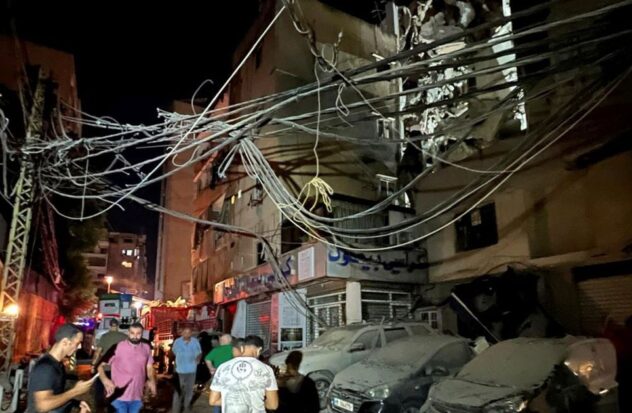Hezbollah did not immediately confirm the commander’s death. The Israeli strike represents an escalation in hostilities against the Lebanese terror group. An Israeli official said the target was Fouad Shukur, a senior Hezbollah military commander whom the United States blames for planning and carrying out the deadly attack on marines in the Lebanese capital in 1983.
“Israeli Air Force fighter jets have killed the top military commander of the Hezbollah terrorist organization and head of its strategic unit, Fuad Shukr, in the Beirut area,” the armed force announced in a statement.
He added that Shukr was responsible for Saturday’s attack in Majdal Shams, “in which 12 children were killed after Hezbollah fired an Iranian Falaq-1 rocket directly at a soccer field in northern Israel on Saturday night,” Israeli military spokesman Daniel Hagari said in a video.
Nasrallah’s right hand man
“Fuad Shukr was the right-hand man of Hassan Nasrallah, the leader of Hezbollah, and his advisor in planning and directing attacks and operations,” Hagari added.
He said Shukr was a “high-ranking terrorist with the blood of Israelis and many others on his hands.”
Lebanese Prime Minister Najib Mikati denounced a “blatant aggression” and a “criminal act” and urged the international community to “exert pressure to force Israel to stop its aggression and threats.”
Iran, which supports Hezbollah, reacted by saying that it was a “ruthless and criminal act by the Zionist criminal gang.”
Israel and the United States have accused Hezbollah of Saturday’s bombing of the town of Majdal Shams on the Israeli-annexed Golan Heights plateau.
The Lebanese group, an ally of the Palestinian Islamist movement Hamas, denied being behind the attack.
“Forbidden” revenge
Hagari said the Israeli military wants to avoid a major conflict with Hezbollah but is prepared for “any scenario.”
“Hezbollah’s continued aggression and brutal attacks are dragging the Lebanese people and the entire Middle East into a further escalation,” Hagari said.
“While we prefer to resolve hostilities without a wider war, the IDF is fully prepared for any scenario,” he added, referring to the Israel Defense Forces.
Druze leaders in the town of Majdal Shams, however, said they rejected any response, citing the doctrine governing their community, whose religion is derived from Islam.
“The tragedy is immense,” they stressed. But since the Druze doctrine “forbids murder and revenge in any form, we refuse to shed a drop of blood under the pretext of avenging our children,” they added.
Since the war in Gaza began, triggered by the Hamas terrorist group’s attack in southern Israel on October 7, clashes between the Israeli army and Hezbollah on the border between Israel and Lebanon have been almost daily.
An Israeli civilian was killed by a rocket attack in northern Israel on Tuesday, rescue services said, and the army said it was responding to a barrage of rockets fired from Lebanon.
The International Committee of the Red Cross (ICRC) said Tuesday it was “very concerned about the growing threat of widespread conflict across the region” and “strongly called on all parties and the international community to work urgently to reduce tensions.”
Several airlines, including Air France and Germany’s Lufthansa, have suspended flights to Beirut since Monday.
Jan Yunis’ withdrawal
In the Gaza Strip, the Israeli army continued its bombing campaign against Hamas, which Israel, the United States and the European Union consider a terrorist organisation.
The towns of Khan Younis and Rafah in the south of the Strip, as well as the Al-Bureij displaced persons camp in the centre and Gaza City in the north, were targeted by airstrikes and artillery fire.
Since July 22, Israeli forces have been carrying out an operation in the Khan Yunis area, which has so far left around 300 dead, according to the Gaza Civil Defense.
The Israeli army said Tuesday it had completed the operation, which had allowed it to eliminate “more than 150 terrorists.”
The war broke out on October 7, when Islamist terrorist commandos killed 1,197 people, mostly civilians, and kidnapped 251 in southern Israel, according to a count based on official Israeli data.
The Israeli military estimates that 111 people remain captive in Gaza, 39 of whom are believed to have died in captivity.

